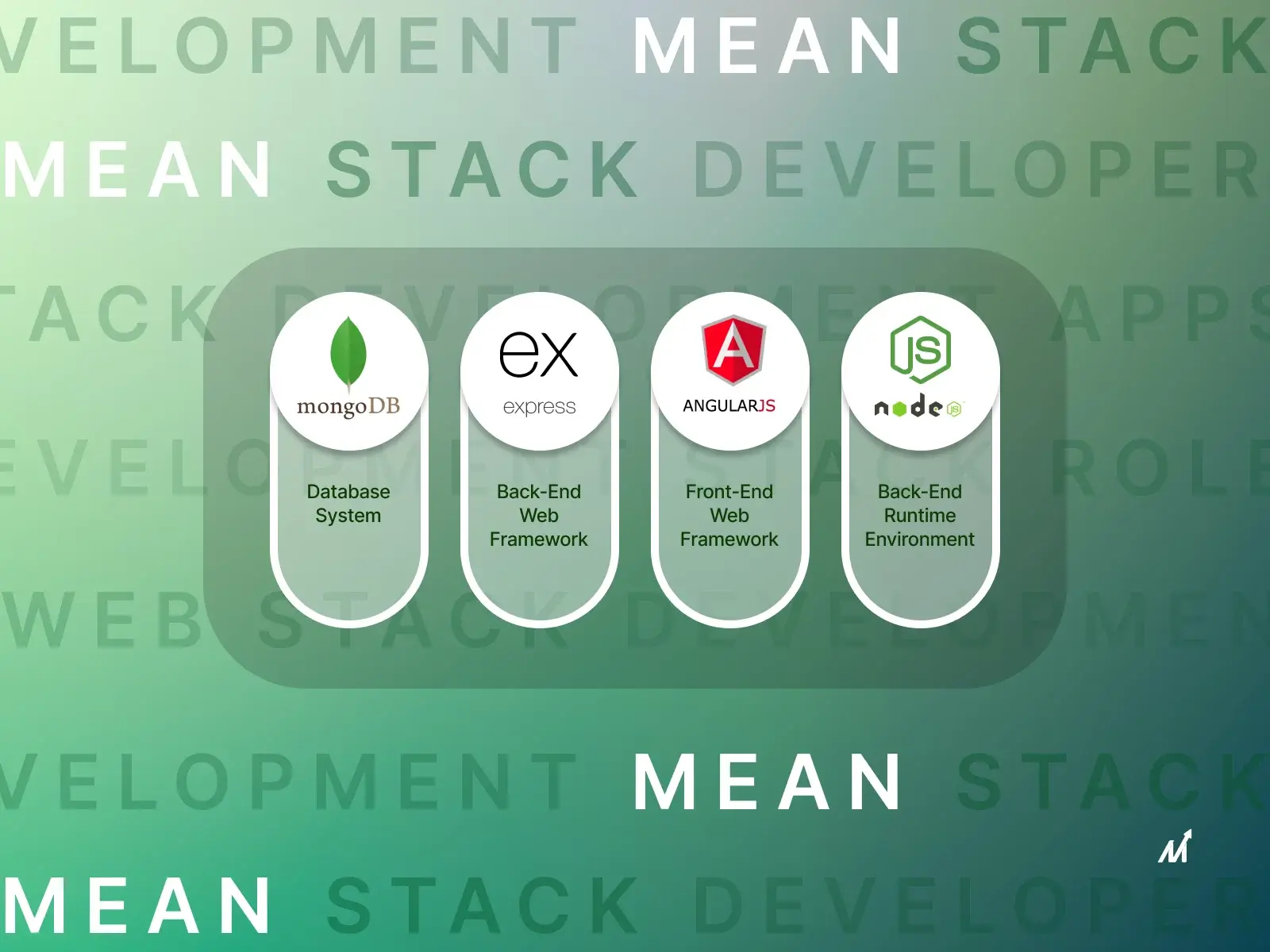A Mean Stack developer brings together a unique blend of technologies in the development process. This blog post delves deeper into each component of the MEAN (MongoDB, Express.js, AngularJS, Node.js) stack and its roles in creating robust web applications.
We’ll begin with an overview of MongoDB’s role within the MEAN stack architecture before moving on to Express.js’ server-side operations. You’ll learn how AngularJS manages the front-end development and how Node.js powers the back-end functionality.
Beyond understanding these technical aspects, we will also explore a few advantages. These advantages include single language usage in application development and cost-effectiveness, making MEAN stack a preferred choice for many developers.
The latter part focuses on what it means to be a Mean Stack Developer – from expected technical proficiency to necessary collaboration skills. We’ll also discuss salary expectations for senior developers and compare full-stack developers with mean-stack developers.
Finally, we will address the potential challenges associated with the MEAN stack. This comprehensive guide aims to provide valuable insights whether you’re just starting your journey or experience in this technology domain.
Understanding the MEAN Stack
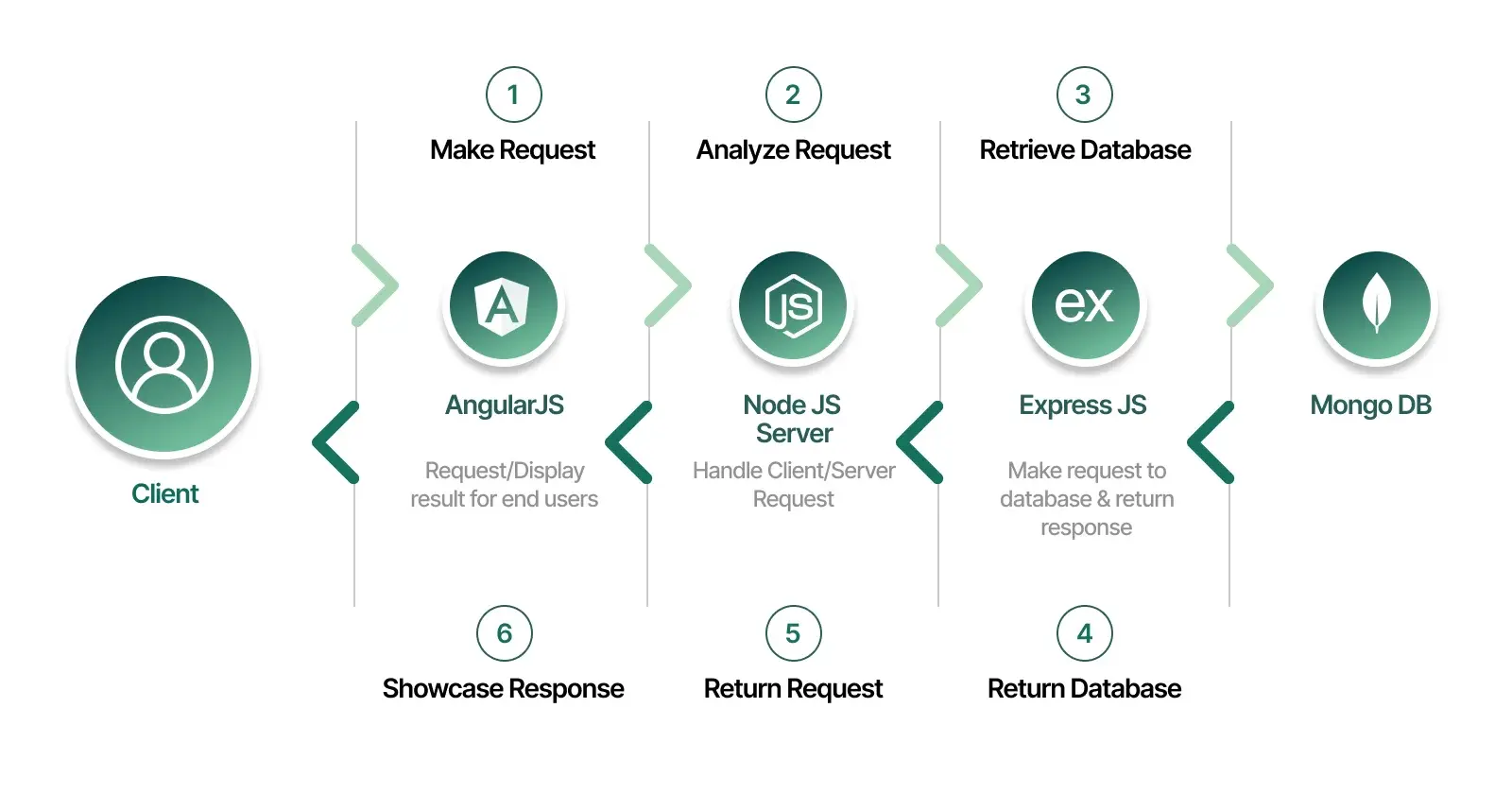
The MEAN stack can help build web apps using an efficient JavaScript-based framework. The four open-source components are MongoDB, Express.js, Angular.js, and Node.js which seamlessly integrate to form the MEAN stack for web app development.
MongoDB: The Flexible Database
MongoDB is a NoSQL database system that’s highly scalable and performance-oriented. It uses collections of JSON-like documents instead of tables, making it a favorite among developers who love the flexibility.
Express.js: The Lightweight Framework
Express.js is a lightweight and unopinionated web application framework that sits atop Node.js. It provides modules and components to manage web development tasks like routing and session management.
AngularJS: The Frontend Master
AngularJS is a structural JavaScript MVC Framework developed by Google. It simplifies the development and testing of single-page applications by providing a comprehensive suite of tools, including two-way data binding capabilities.
Node.js: The Backend Boss
Node.js is a runtime environment built on Chrome’s V8 JavaScript engine. It allows developers to write server-side scripts that produce dynamic content before the page is sent to the client, improving overall site speed performance.
Combining these four technologies creates the foundation of what is generally known as “full-stack” JavaScript. You can build complete real-time cloud-hosted apps or websites using just one language throughout your project – quite a remarkable feat.
Advantages of Using the MEAN Stack
The MEAN stack, a collection of JavaScript-based technologies, has become increasingly popular in web application development. It uses a single language throughout the application process. This process simplifies coding and reduces potential errors caused by frequently switching contexts.
Uniformity in Language Usage
MEAN’s uniformity in language usage sets it apart from other frameworks. All four components are based on JavaScript, eliminating the need to switch between different languages during various stages of production. This consistency extends beyond programming – even databases stored in MongoDB are written in JSON format, making data manipulation and retrieval easy than traditional SQL databases.
Cost-Effective & Speedy Development
MEAN is economical for startups or companies with tight budgets looking to build dynamic web applications quickly without compromising quality or performance. All components are available to use without cost. Using one common language across all layers accelerates product development speed considerably. The non-blocking architecture of Node.js allows simultaneous request handling leading to faster execution times. Whereas, AngularJS provides reusable code snippets reducing time spent writing repetitive codes. Hence, it speeds up the overall project timeline more than anything else. Also, it helps when creating real-time cloud-hosted apps or websites where scalability matters significantly.
MEAN is an ideal choice when building scalable cloud-hosted applications or websites.
Mean Stack Developer: Role and Responsibilities
The digital world is changing, and the MEAN stack has emerged as a powerful technology for web app development. A Mean stack developer plays a vital role in any product development team. They possess understanding of each component technology and collaborate effectively with other specialists.
Technical Proficiency Expectations
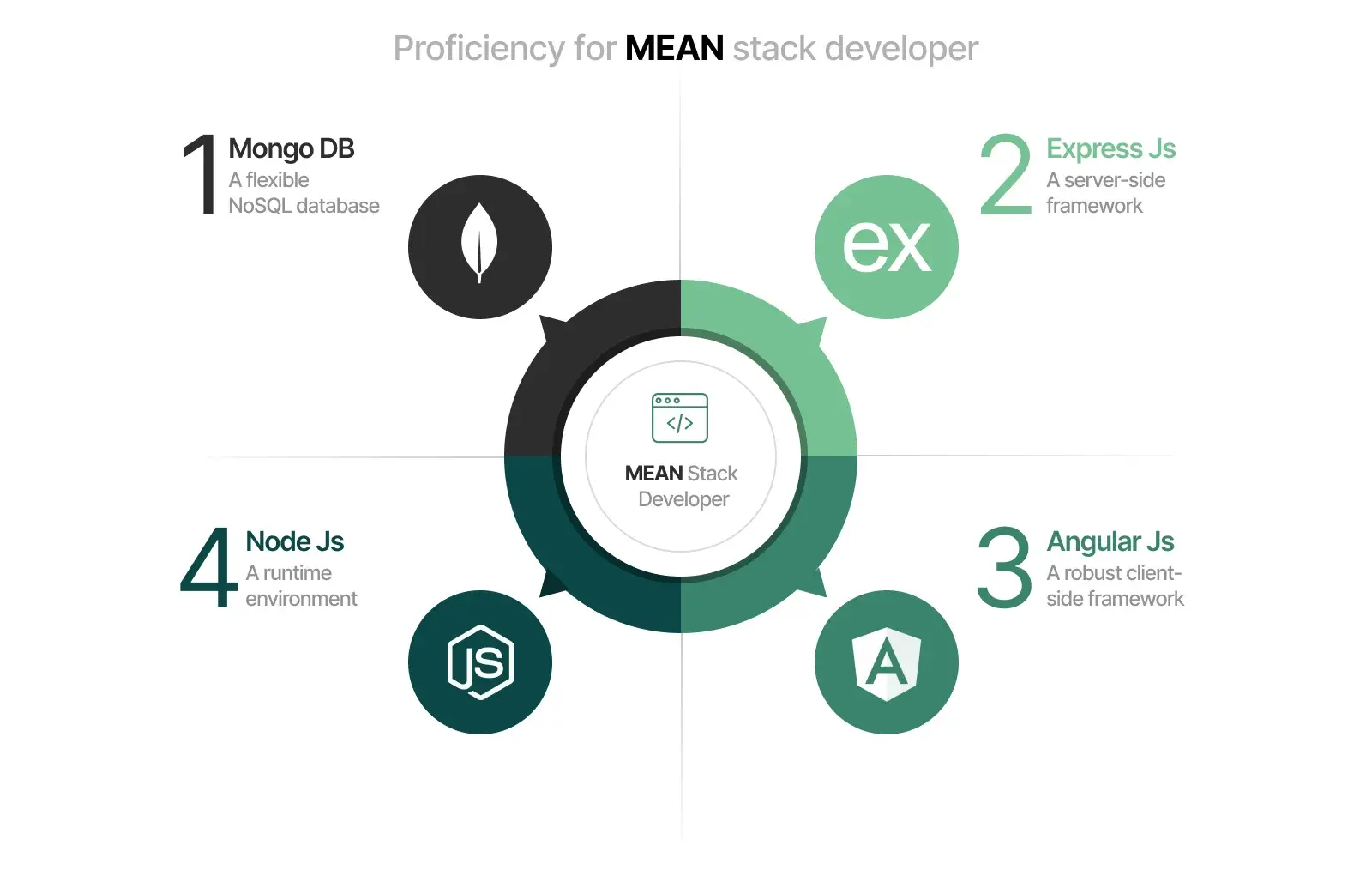
MEAN stack developers need a firm grasp of each component:
- MongoDB: A flexible NoSQL database for working with large volumes of data across different formats.
- Express.js: A server-side framework that simplifies routing and middleware setup.
- AngularJS: A robust client-side framework for creating dynamic single-page applications.
- Node.js: A runtime environment for building scalable network applications.
Collaboration & Teamwork Skills Required
Successful MEAN stack developers must also demonstrate excellent collaboration and teamwork skills, working closely with project managers, designers, testers, and other stakeholders to ensure the final product meets user needs and adheres to industry standards. Soft skills like communication and problem-solving ability are highly valued by tech employers today.
Senior Mean Stack Developer Salaries: What to Expect
Mean Stack developers are in high demand, and senior developers with expertise in MongoDB, Express.js, AngularJS, and Node.js can command impressive salaries. The salary of a Mean Stack developer depends on factors like location, company size, and industry sector. A proficient senior Mean Stack developer could earn up to $200K annually.
While this figure may seem high, it’s important to remember the significance of Mean stack developers in a digital product development team. Collaborating effectively with analysts, designers, and data implementation specialists, ensures a seamless app experience from both front-end and back-end perspectives.
According to PayScale, the average salary for a Senior Software Engineer (which includes MEAN stack developers) in the United States is around $121k annually. However, this figure can be higher based on additional skills like AI or ML, which have become crucial for web development projects.
Outsourcing: Mean Stack Developer
Outsourcing is a viable option for companies looking for cost-effective alternatives without compromising quality. With remote work gaining popularity, many organizations now hire skilled Mean Stack developers from countries where tech talent abounds, but rates remain relatively lower than the US market. Clutch’s latest report provides detailed insights into global IT outsourcing trends that you may find valuable if considering this route.
- Affordability: Outsourcing allows businesses to access highly skilled professionals at significantly reduced costs compared to US-based counterparts, making it an attractive proposition for startups and established enterprises seeking to optimize operational expenses while maintaining product quality standards.
- Flexibility: It offers flexibility to scale up or down project requirements as they change over time, eliminating the need for long-term commitments to resources that are not always required.
- Diverse Skill Set: By choosing to outsource, one gets the opportunity to tap into a diverse pool of talents, each bringing a unique skill set to the table, hence enriching the overall project outcome through varied inputs and ideas.
To sum up, whether you’re planning to hire a full-time employee or outsource Mean Stack development tasks, understanding current market rates, the potential benefits and drawbacks of each approach will help you make an informed decision that aligns best with your organizational goals and budget constraints.
Key Takeaway:
Senior Mean Stack developers with expertise in MongoDB, Express.js, AngularJS, and Node.js can earn up to $200K annually. Outsourcing is a viable option for companies seeking cost-effective alternatives without compromising quality. It offers affordability, flexibility, and a diverse skill set.
Full-Stack vs. MEAN-Stack Developers: Who Wins?
Software engineering involves various kinds of coders, yet two of the most widely recognized are full-stack and MEAN-stack engineers. Both manage front-end and back-end aspects, but their approach differs significantly.
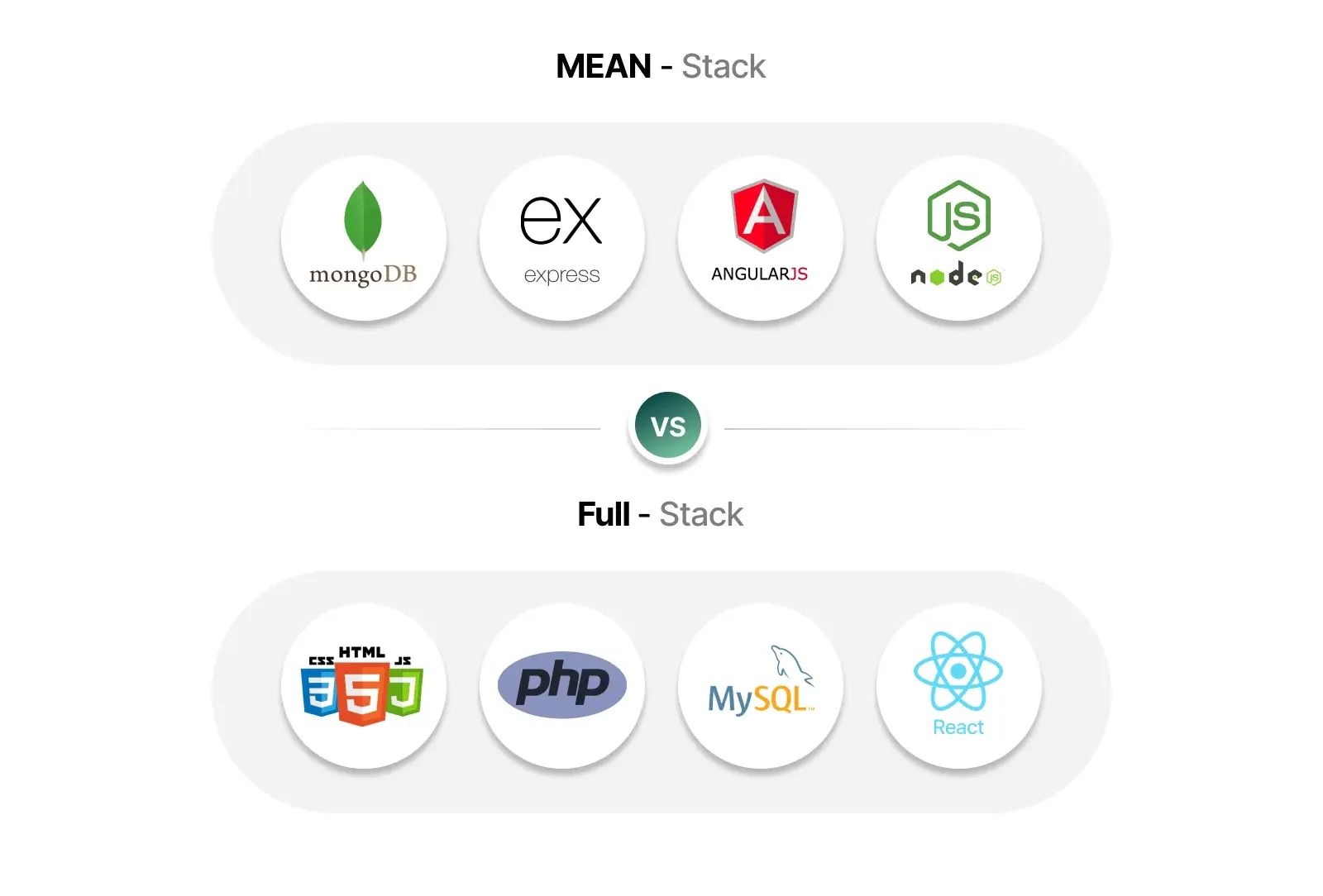
Full-Stack Developers:
A full-stack developer is a multi-skilled individual with expertise in multiple technologies, making them an invaluable asset to any development team. They are experts in various technologies, making them versatile team members, handling tasks efficiently.
- Diverse Skill Set: Full-stack developers know multiple stacks, allowing them to work on all aspects of a project from start to finish.
- Versatility: Their broad skill set makes them valuable team members who can step into different roles as needed throughout a project’s lifecycle.
MEAN-Stack Developers:
The phrase “MEAN Stack Developer” denotes an individual proficient in utilizing MongoDB, Express.js, AngularJS/ReactJS, and Node.js technology. This combination offers advantages over traditional full-stack development methods due to its exclusive reliance on JavaScript-based technologies.
- Faster Development Process: The uniformity provided by MEAN stack eliminates the need to switch between different programming languages during various stages of production. Mean stack makes it easier and faster to develop applications than traditional full-stack methodologies.
- Easier Maintenance & Scalability: MongoDB’s document-oriented model combined with Node.js’ event-driven architecture provides high scalability, making maintenance simpler than other stacks.
Picking The Right Developer For Your Project?
Your choice between hiring a MEAN-stack developer vs. a full-stack developer depends upon your specific project requirements. If you’re building an application that heavily relies on real-time updates like chat apps or gaming platforms, opting for MEAN-stack could be beneficial given its non-blocking I/O nature powered by Node.js. On the other hand, if your needs involve complex business logic where understanding diverse tech stacks becomes crucial, then having a full-stack developer might serve a better purpose. Before choosing any particular type, you should analyze the scope and complexity of your upcoming projects and make an informed decision.
Key Takeaway:
The article compares full-stack and MEAN-stack developers, highlighting the diverse skill set and versatility of full-stack developers. Meanwhile, MEAN-stack developers specialize in MongoDB, Express.js, AngularJS/ReactJS, and Node.js for faster development processes and easier maintenance & scalability. Choosing between the two depends on project requirements as real-time updates or complex business logic.
Challenges of the MEAN Stack
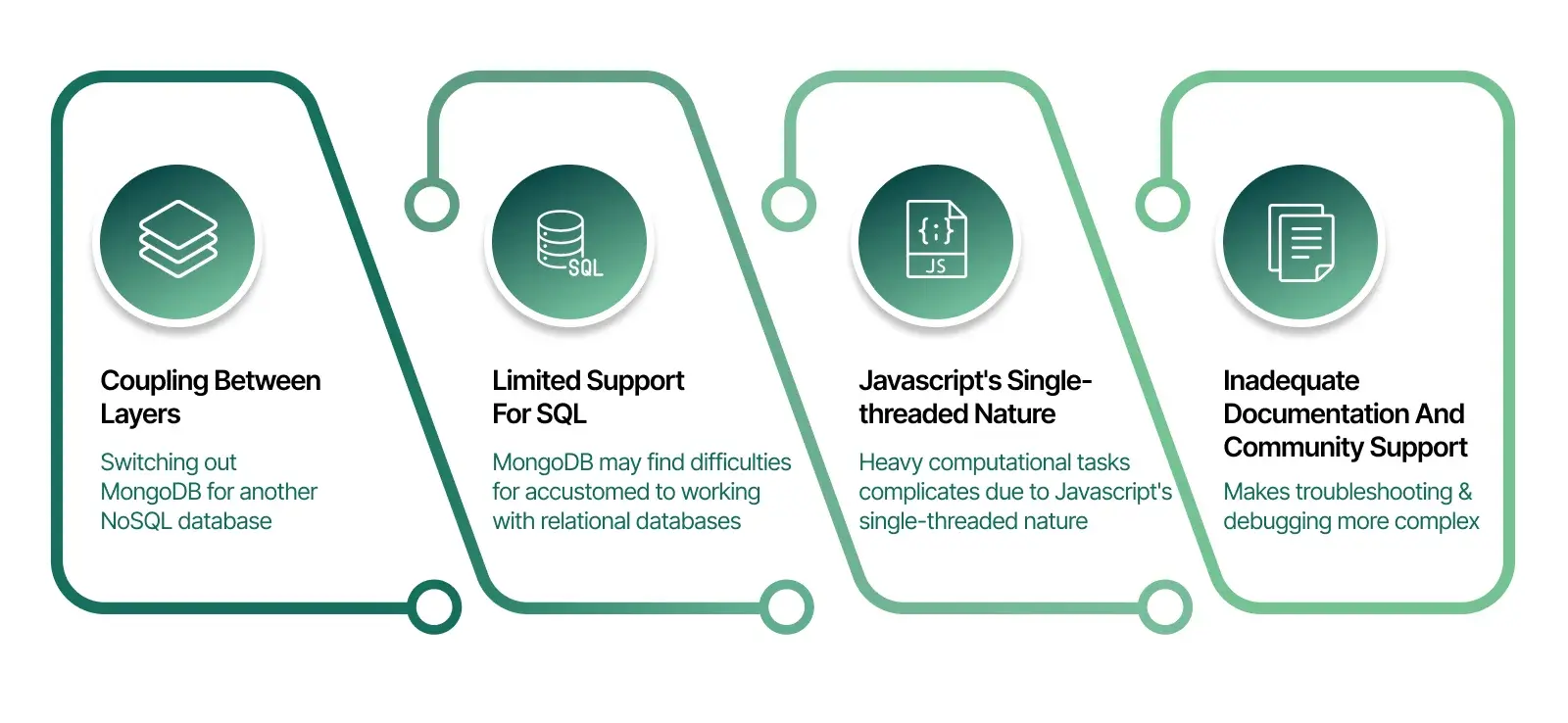
The MEAN stack is a great tool, but it’s not perfect. Concurrency performance issues can be a headache due to the scale nature of JavaScript. Callback hell is also a possibility if you don’t have a good grasp of promises and async-await.
Coupling Between Layers
Switching out MongoDB for another NoSQL database can be a pain since it’s tightly coupled with Express.js and AngularJS. Be prepared for significant code changes across all layers.
Limited Support For SQL
MongoDB may present difficulties for those accustomed to working with relational databases. However, tools such as MongoDB BI Connector can assist at the cost of additional resources. While tools like MongoDB BI Connector can help, they have added cost implications.
Javascript’s Single-threaded Nature
Heavy computational tasks are complicated due to Javascript’s single-threaded nature. While Node.js has introduced worker threads, they still have limitations compared to traditional multithreading in languages like Java and C#.
Inadequate Documentation And Community Support
Documentation and community support for newer versions of AngularJS and Express.js can be lacking, making troubleshooting and debugging more challenging.
Despite these challenges, the MEAN stack’s popularity and adoption continue to grow thanks to its versatility and flexibility. It’s a valuable tool in any modern developer’s arsenal.
FAQs – Mean Stack Developer
What is a Mean stack developer?
A MEAN stack developer specializes in using MongoDB, Express.js, AngularJS, and Node.js to develop web applications.
What is the future of Mean stack development?
The future for MEAN stack developers looks promising with increasing demand for full-stack developers and the rise in JavaScript-based technologies like Angular.
What is the salary of a Mean stack developer?
The average annual salary for a senior-level MEAN stack developer in the United States ranges from $80K to $120K.
Is MEAN stack still relevant?
Despite emerging tech stacks, the MEAN stack remains relevant due to its flexibility and scalability, making it popular among startups and large enterprises.
However, it’s important to note that staying up-to-date with the latest technologies and continuously learning new skills is crucial for any developer to remain relevant in the industry.
Check out MongoDB’s MEAN stack page for more information on MEAN stack development.
Conclusion
Hiring a MEAN stack developer means you’re using MongoDB, Express.js, AngularJS, and Node.js to develop your web applications. MEAN has its perks, like using a single language for development and being cost-effective. However, it also comes with its challenges.


